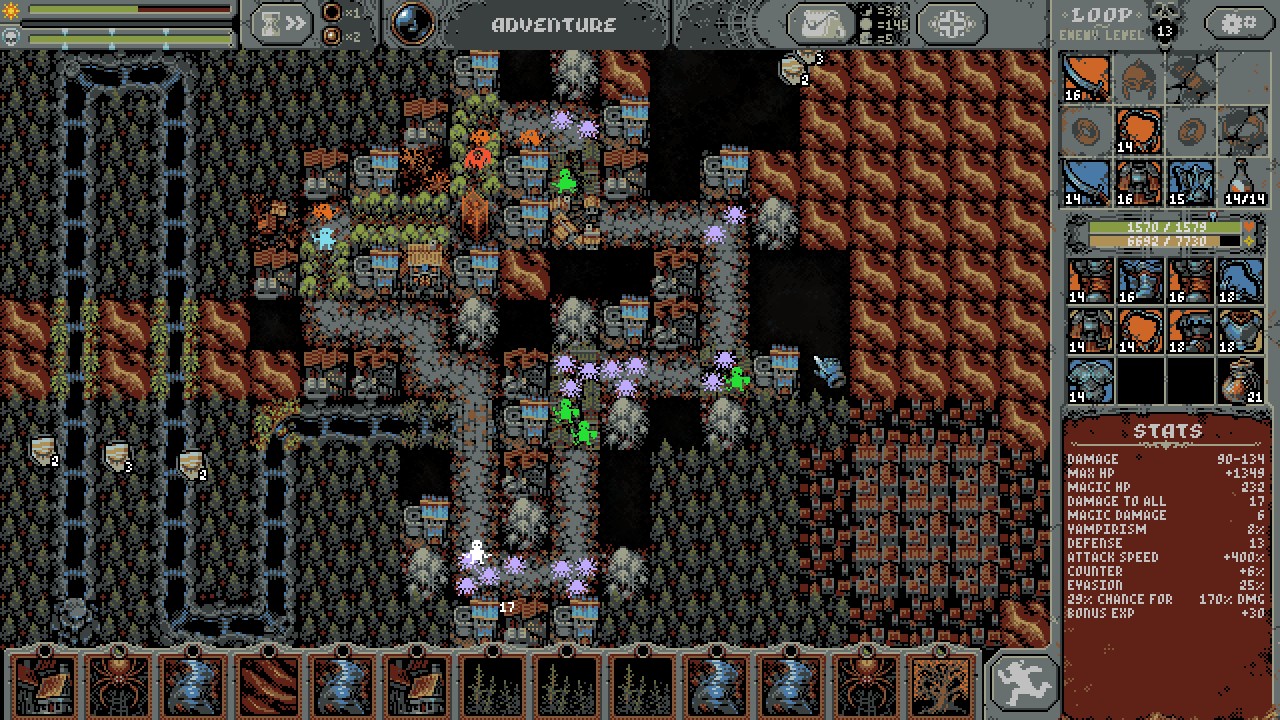I’ve probably spent more hours playing Loop Hero over the past few days than I have any game that I’ve played for leisure in a similar span of time. I’m seeing pixelated ratwolves in my nightmares. I hear one of the three looping 8bit tracks as a back beat to my tinnitus. Four Quarters’ idle-like is stuck deep in the wrinkles of my grey matter, sometimes like the pleasant sensation of a nice conversation or a clever part in a good book. Other times, like that embarrassing thing you did in middle school that only shows up while you’re trying to sleep.
Best described as a game where you are a hero who is also their own dungeon master, Loop Hero has been 2021’s first big indie hit, ensorcelling half a million gamers and answering the question “what’s the greatest podcast game ever made?” In it, you must create the environment your hero treks through as they move through it. They automatically walk a road (the eponymous “loop”) stopping to fight creatures and pick up loot that you put in their way via cards you draw from a deck that you create before going on these expeditions.
 I am repeatedly reconfiguring my deck between runs because it seems like there is an endless amount of weird combinations and reactions to find. Playing a card on the road like a Village is a good idea. Every time your hero passes through it, they gain a bit of hit points. Adding a wheat field on either side raises the amount of hit points gained from walking through at the cost of sometimes being a home for angry scarecrows. Remove that village somehow, and the empty wheat fields get overgrown, creating sentient tufts of homicidal grass. Put a vampire mansion on the side of the road across from a village, and that village gets ransacked, filling it with ghouls.
I am repeatedly reconfiguring my deck between runs because it seems like there is an endless amount of weird combinations and reactions to find. Playing a card on the road like a Village is a good idea. Every time your hero passes through it, they gain a bit of hit points. Adding a wheat field on either side raises the amount of hit points gained from walking through at the cost of sometimes being a home for angry scarecrows. Remove that village somehow, and the empty wheat fields get overgrown, creating sentient tufts of homicidal grass. Put a vampire mansion on the side of the road across from a village, and that village gets ransacked, filling it with ghouls.
So many cards have potential branching consequences like this, and the various ways things fit together and are modified – by each other, your hero’s character class, the buildings you’ve upgraded at home based, etc. – is the ingenious core of it all. They’re is an incredible amount of space for expression and depth to get lost in for a game that you spend so much time not actually playing.
 And there is part of my issue. Loop Hero is open and running almost every day, almost all the time. In between meetings, emails, hell, thoughts, I’m clicking into and out of the window to make sure there has been no sudden speed bumps on my heroes slow freeway to glory. I don’t have to constantly hover over it to make sure things are going smoothly, but I can’t help but need to check in every minute or so just to touch things I don’t need to be fiddling with. There’s a strategy to tile placement and monster selection, but there’s rarely any moment to moment tactical stuff asked from you. The game wants me to just chill out and dungeon vibe, and I do that to the best of my ability. But everything about this little experience feels so neat that I kind of just want to be in Loop Hero’s presence while it minds it’s own business, like me taking too many pictures of a brand new pet.
And there is part of my issue. Loop Hero is open and running almost every day, almost all the time. In between meetings, emails, hell, thoughts, I’m clicking into and out of the window to make sure there has been no sudden speed bumps on my heroes slow freeway to glory. I don’t have to constantly hover over it to make sure things are going smoothly, but I can’t help but need to check in every minute or so just to touch things I don’t need to be fiddling with. There’s a strategy to tile placement and monster selection, but there’s rarely any moment to moment tactical stuff asked from you. The game wants me to just chill out and dungeon vibe, and I do that to the best of my ability. But everything about this little experience feels so neat that I kind of just want to be in Loop Hero’s presence while it minds it’s own business, like me taking too many pictures of a brand new pet.
That is a pretty good issue to have, in reality. It’s not my only one, though. As there is a sort of charm to not knowing what things do until you interface with them and find out on the fly, that isn’t always a fun surprise. It’s not always clear how certain tiles are being affected by the ones around it because all of that sort of data is tucked away behind the scenes. Some of the info that is clear and present is often pretty obscure as well. Take the necromancer class for instance, which has some unique stats that the other two, the warrior and rogue, do not. Since they raise skeletal minions to do the attacking for them, they have a set of stats specifically for them. Max Skeleton amount is straightforward, but the difference between skeleton level and skeleton quality is something most of the community in places like reddit and Steam just agree mean power and chance to summon better types of skeletons, respectively. This is something the game should be telling us. Making this opaque does not present the same sense of discovery as finding out that creatures that die in battle fields can leave ghosts behind, and that those ghosts can sometimes leave scarier, more bizarre ghosts.
Eventually, you will get the hang of it. If you stuck with it for more than 10 hours, then you surely have the working knowledge necessary to progress at a solid clip. 10 more hours go by, and you’ll realize that you’ve turned the music off because you don’t need it to actually be playing to hear every note in your head. 10 more hours pass, and little lo-fi warriors will run little circles around your every thought.
It’s more fun than it sounds…






